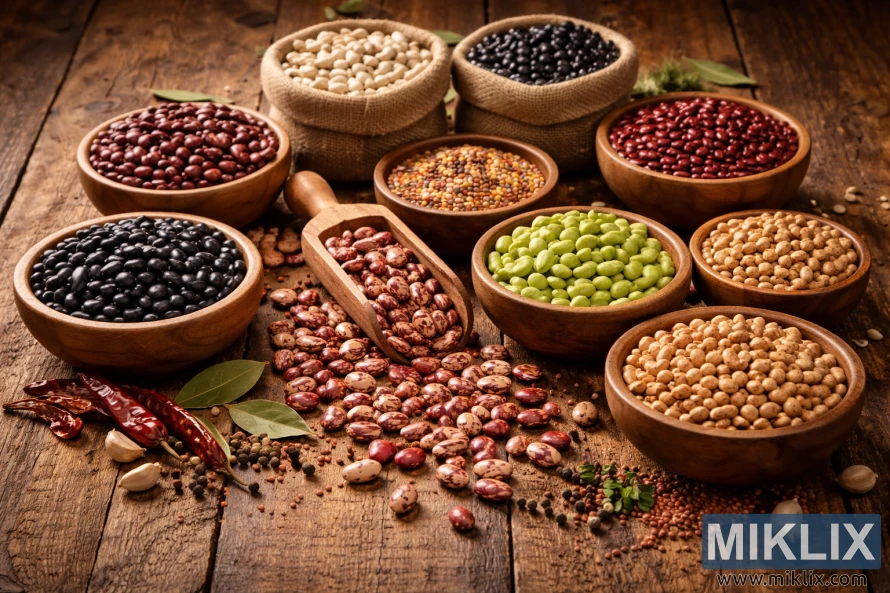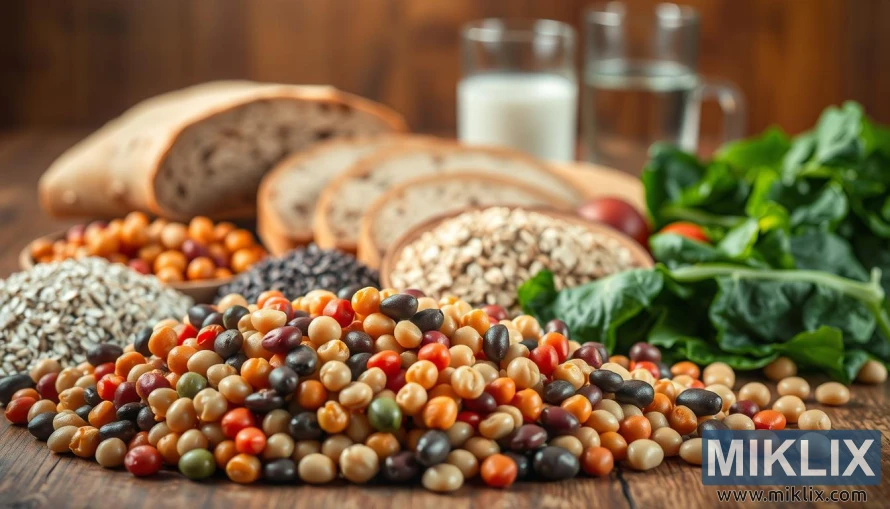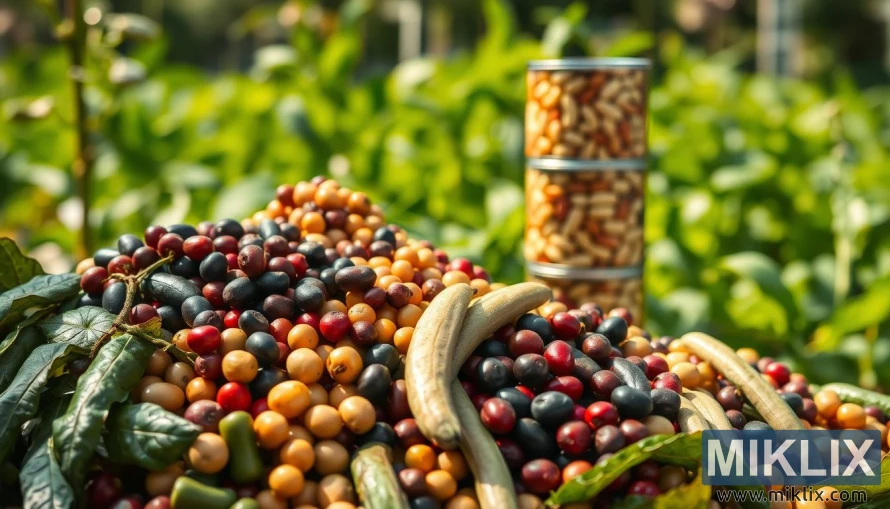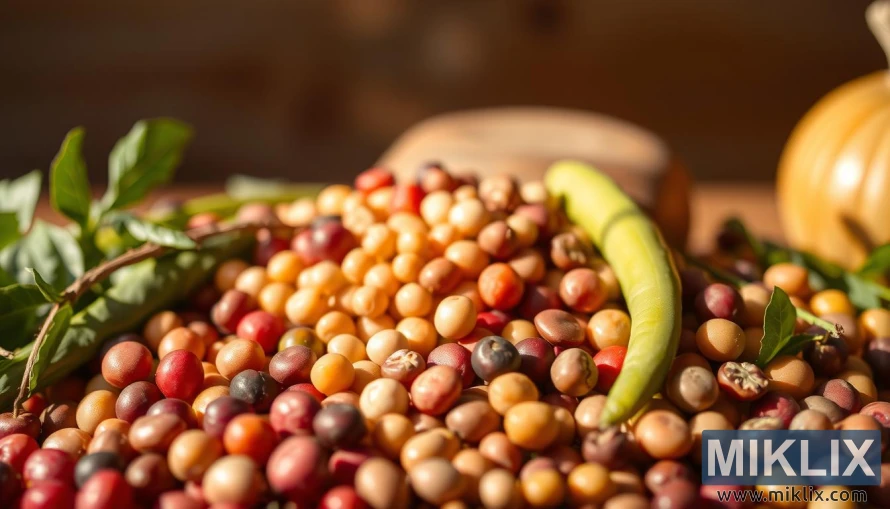Beans for Life: The Plant-Based Protein with Perks
Published: May 15, 2025 at 11:44:47 AM UTC
Last updated: December 26, 2025 at 10:41:20 AM UTC
Beans are more than just a staple food; they are a powerhouse of nutrition. They are classified as legumes and are packed with plant-based protein, dietary fiber, vitamins, and minerals. Adding beans to your diet can improve heart health and digestion. They also offer many other health benefits. Their unique nutritional value makes them key for better health through diet.

Key Takeaways
- Beans are packed with plant-based protein, making them an excellent alternative to animal proteins.
- They provide essential dietary fiber, contributing to better digestive health.
- Regular consumption of beans can support heart health and reduce the risk of chronic diseases.
- Beans help in managing blood sugar levels, making them ideal for those with diabetes.
- These legumes are a versatile ingredient that can be easily incorporated into various dishes.
- Eating beans can be a cost-effective way to boost your overall nutrition.
Introduction to Beans and Their Nutritional Value
Beans are a key part of many diets, known for their nutritional benefits. They are rich in protein, fiber, iron, and vitamins. A half-cup serving of beans provides a lot of dietary fiber, which helps with digestion and gut health.
Beans are also low in saturated fat, making them a great choice for a healthy diet. They offer the benefits of vegetables and protein, all in a low-calorie package. This makes beans a valuable addition to any diet, appealing to vegetarians and health enthusiasts alike.
High Protein Content in Beans
Beans are a great source of plant-based protein. They are perfect for anyone who doesn't eat animal products. Each type of bean has a lot of protein, helping you meet your daily needs. For example, black beans have about 6.9 grams of protein in a 100-gram serving.
Beans alone don't have all the amino acids needed for complete protein. But, mixing them with grains or nuts makes a complete meal. This is great for vegetarians and vegans looking for protein.
Eating beans makes your meals tasty and nutritious. They have a lot of protein, which is good for your health. Beans help you stay healthy and feel good.
Rich Fiber Content: A Key to Digestive Health
Beans are packed with fiber, which is great for your digestive health. Eating foods high in fiber, like beans, helps keep your bowel movements regular. This prevents constipation.
Black beans, for example, have about 8 grams of fiber in one serving. This fiber is good for your gut health. It helps grow the good bacteria in your intestines. Good gut bacteria are key for digesting food well and absorbing nutrients.
Fiber does more than just keep you regular. It also helps lower cholesterol levels. Adding beans to your meals can make your digestive system healthier. A healthy digestive system is vital for your overall health.

Beans and Heart Health
Eating beans can greatly improve heart health. Many studies show that eating beans often lowers the risk of heart disease. Beans are packed with fiber, protein, and vitamins that help keep you healthy.
Beans are great for controlling cholesterol levels. Switching to beans from fatty meats can improve your blood fats. This can lead to less "bad" cholesterol, which is a major heart disease risk.
Beans are also full of fiber, which is good for your heart. Fiber helps clear out bad cholesterol from your blood. This can lower your chance of heart attacks. Adding beans to your meals can make your food taste better and protect your heart.
Promoting Healthy Blood Sugar Levels with Beans
Adding beans to your meals can help keep blood sugar levels healthy. Beans are packed with fiber and complex carbs. These nutrients slowly release glucose into your blood. This slow release is better for managing diabetes than foods like rice and potatoes.
Eating beans regularly might lower your risk of getting type 2 diabetes. Beans have a low glycemic index. This means they don't cause blood sugar to spike quickly. Instead, they provide steady energy all day, helping your metabolism stay healthy.
Beans are great for more than just blood sugar control. They add variety to your diet. You can use them in salads, soups, or as a side dish. Including beans in your meals is a smart way to boost your health and manage diabetes well.
How Beans Support Weight Management
Beans are a great help in managing your weight. They are full of fiber, which makes you feel full for a long time. This can help you eat less and keep your calorie intake down.
Eating beans can really help with weight control. People who eat beans often have lower body weights and smaller waists. Beans are a key part of many diets aimed at losing weight because they help you feel full.

Beans as an Antioxidant Powerhouse
Beans are a great source of antioxidants, like polyphenols. These help fight off free radicals. Free radicals can harm our bodies, but antioxidants stop them. This makes beans good for our health.
Beans help keep our hearts healthy and support aging well. They also boost our immune system. Adding different types of beans to your meals makes your diet more nutritious and tasty.
Folate and Its Importance in Beans
Beans are a powerhouse when it comes to folate, a vital B vitamin. This nutrient is key for DNA synthesis and repair. It's essential for our cells to function well.
Pregnant women get a big benefit from folate. It helps prevent neural tube defects in babies. Eating beans is a great way to get enough folate.
For example, 100 grams of shelled edamame has about 311 micrograms of folate. This shows how nutritious beans are. Eating beans regularly boosts your folate levels and improves your health.
This nutrient-rich food is easy to add to many dishes. It makes meals not only healthier but also tastier.
Beans and Cancer Prevention
The connection between diet and health is clear, with a big role in fighting cancer. Beans are not just good for you; they help lower the risk of colorectal cancer. Their high fiber content is key to keeping your digestive system healthy, which is essential for cancer prevention.
Studies show that eating more fiber can lower the risk of colorectal cancer. Beans help you have regular bowel movements and support good gut bacteria. This leads to better digestion and overall health.
Being overweight is a big risk for many cancers. Adding beans to your meals can help with weight control. They make you feel full and cut down on calories. Beans are easy to add to many dishes, making them a great choice for a healthy lifestyle and fighting cancer.
Improving Gut Health with Beans
Beans are great for meals, helping your gut health a lot. They are full of fiber, which helps good bacteria grow in your stomach. These good bacteria are key in breaking down food and getting nutrients, making your digestion better.
Some beans, like black beans, make your gut's lining stronger. This helps keep diseases away from your gut. Eating beans often helps your gut stay healthy, full of good bacteria.
Beans: A Versatile Ingredient in Your Diet
Beans can make any meal healthier and tastier. They are a key ingredient in many dishes. Cooking with beans boosts both flavor and nutrition.
Beans are great in many recipes. You can add them to:
- Hearty stews for added texture and protein.
- Nourishing soups that warm you up on chilly days.
- Refreshing salads, providing a satisfying crunch.
- Side dishes, taking your meals to the next level.
Try pureeing beans for dips like hummus. It's a tasty addition to your appetizers. Or, mix them into veggie burgers for a flavorful, meatless option. Beans are incredibly versatile, making it easy to eat well and enjoy different tastes.
The Economic Benefits of Eating Beans
Adding beans to your diet can save you money. They are very affordable, making them great for those who want to eat well but don't want to spend a lot. Beans are packed with nutrients and protein, but they cost much less than meat.
This means families on a tight budget can eat well without spending too much. Beans help them save money while keeping their bodies healthy.
Using beans in your meals can really cut down on expenses. Here are some ways beans can help your wallet:
- Beans can replace meat in many recipes, saving you money on groceries.
- They last a long time, so you can buy them in bulk and save even more.
- Beans are very versatile and can be used in many dishes. This helps you plan meals better and waste less food.
Beans are not just good for your wallet; they're also good for your health. They help families make tasty, healthy meals without spending a lot. Choosing beans is a smart move for anyone looking to eat better while keeping their finances in check.

Common Types of Beans and Their Benefits
Beans are a staple in many cultures. They are loved for their taste and health benefits. The most popular types are black beans, kidney beans, pinto beans, and garbanzo beans. Each type has unique nutritional features that make them great for a balanced diet.
Black beans are full of protein and fiber. They help with digestion and muscle health. Kidney beans have a bold flavor and are rich in iron and folate. These nutrients are key for energy and cell function.
Pinto beans have a creamy texture and are full of antioxidants. These antioxidants fight oxidative stress in the body. Garbanzo beans, also known as chickpeas, are versatile. They are packed with vitamins and minerals that are good for the heart.
These common beans can be added to soups, salads, or eaten alone. They make meals taste better and are healthier. Eating different types of beans every day can make your diet more balanced. This leads to many health benefits for everyone.
Tips for Cooking and Incorporating Beans
Cooking beans right makes them easier to digest and tastier. Soaking dried beans overnight cuts down cooking time and gas. Canned beans are quick and easy, but rinsing them can lower sodium.
Adding beans to meals is easy and rewarding. Here are some tips:
- Add beans to soups and stews for extra protein and fiber.
- Put beans in salads for a nutritious twist.
- Use beans as a filling in tacos or burritos for a filling meal.
- Blend beans into sauces for a creamy texture without dairy.
Start slow with beans to avoid digestive issues. Try different types to find new flavors and textures.

Conclusion
Adding beans to your diet has amazing health benefits. They help with digestion and support heart health. They also lower the risk of some cancers.
Beans are easy to add to many meals. You can put them in salads, soups, or as a main dish protein. They're packed with nutrients and are affordable.
Beans are great for any diet, from plant-based to family meals. They make healthy eating easy and fun. Including beans in your meals is a smart choice for your health.
Further Reading
If you enjoyed this post, you may also like these suggestions:
- How Goji Berries Can Transform Your Health and Energy Levels
- Tomatoes, the Unsung Superfood
- From Digestion to Detox: The Healing Magic of Papaya
